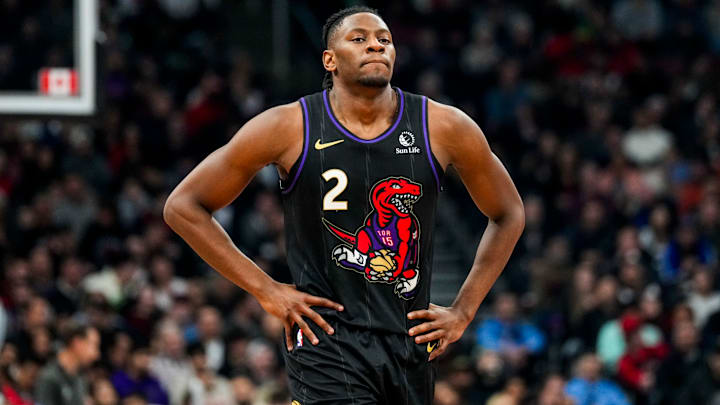With veterans like Davion Mitchell and Chris Boucher showcasing glimpses of talent yet struggling in recent games, the question arises: should the team prioritize the development of their promising rookies?
Molding the Raptors' next generation
While the initial outings of Mitchell and Boucher hinted at their value as crafty veteran leaders, their performances have not been consistent enough to warrant heavy minutes. The time may have come for the Raptors to shift their focus towards nurturing their youthful talent.
Boucher’s resurgence was a beacon of hope after a turbulent stint that nearly derailed his career. Once relegated to the fringes of the Raptors' rotation, his ability to seamlessly mesh with the team's dynamics had fans optimistic.
Meanwhile, Davion Mitchell, a former lottery pick, transitioned from Sacramento and quickly adapted to a key role on the Raptors. At 26, Mitchell may fall in a gray area between youth and experience, but his contributions have been critical during the early stages of this season—until they weren't.
With both veterans faltering in recent outings, Toronto's coaching staff must consider minimizing their minutes to give fresh legs a shot. The emergence of overlooked rookies like Jamison Battle, Jonathan Mogbo, and Jamal Shead offers the Raptors a glimmer of hope. Despite the overall underwhelming performance of the 2024 draft class at the season's outset, Battle, Mogbo, and Shead have all distinguished themselves.
However, their early-season magic faded as they encountered limited opportunities. Allocating more minutes to these promising talents could prove pivotal for the franchise’s long-term success. As shown in games where they received extended play, Battle, Mogbo, and Shead have the potential to be the spark that the Raptors desperately need. But finding consistent playing time in a crowded rotation hasn't been easy for the newcomers.
Both Boucher and Mitchell have had plenty of playing time this season, which not only showcases their skills but also provides potential trade suitors with ample footage to assess their contributions. This situation presents a critical crossroads for the Raptors, as the balance between leveraging veteran experience and nurturing young talent becomes essential for the team's future.
As the season progresses, the Raptors must adeptly manage minute allocations to maximize their roster's potential. The challenge is identifying the right balance—providing crucial experience for rookies while ensuring that veterans do not monopolize playing time.
Returning veterans like Kelly Olynyk and Bruce Brown are poised to further complicate the distribution of minutes as they recover from injuries. Nevertheless, it’s crucial that the coaching staff does not overlook the potential benefits of regularly integrating young players into the lineup. The Raptors should adopt a more long-term approach to their rotation, highlighting rookies who are anticipated to become cornerstones of the franchise in the coming years, as they have done by granting Ja'Kobe Walter starting minutes in the last two games.
Toronto needs to ensure its rookies grow with regular playing time
The game against the Detroit Pistons on November 25 serves as a prime example of what a rejuvenated roster can accomplish. The trio of rookies alongside Boucher transformed a lackluster unit into a revitalized "Bench Mob 2.0". Their collaboration demonstrated effective ball movement, defensive tenacity, and an infectious energy that the team desperately needed.
Then, take a look at the Raptors’ game against the Miami Heat on November 29. Jamal Shead received only seven minutes of play, while Davion Mitchell played 20. Seven minutes is far too small a sample size to gauge a significant impact, but despite this, Shead recorded three assists and achieved a +5 plus/minus rating.
Mogbo’s performances have suggested even more promise, particularly in his synergy with Scottie Barnes. His improved three-point shot has made him a valuable asset on the court, and with more playing time, he could further elevate his impact. The challenge lies in granting these talented rookies enough minutes to shine while ensuring that the team competes effectively.
It isn’t about sidelining veterans like Mitchell and Boucher entirely, but rather strategically reducing their minutes to allow younger players to establish themselves as vital members of the roster. Toronto cannot afford to miss the chance to cultivate their emerging talents. Balancing playing time across the roster will not only enhance team chemistry but could ultimately set the Raptors on a trajectory that rewards both current competitiveness and future potential.
